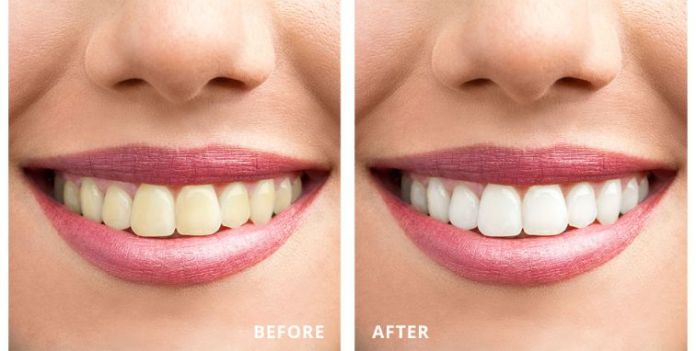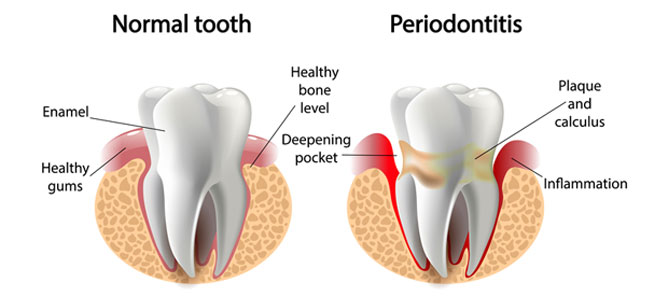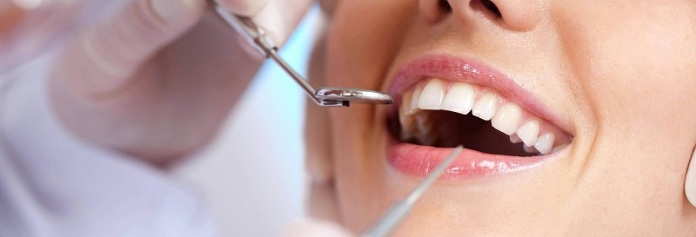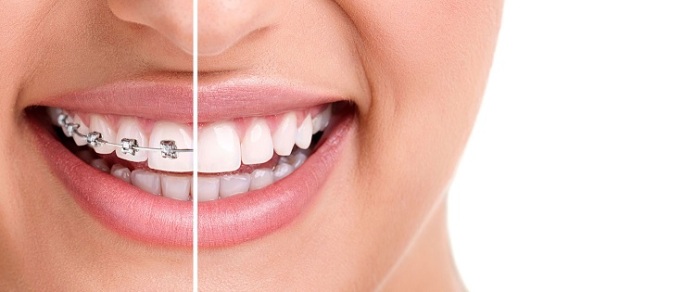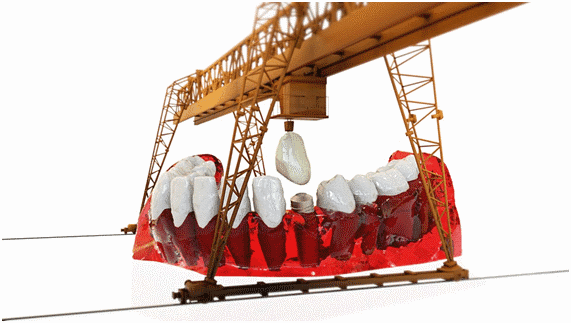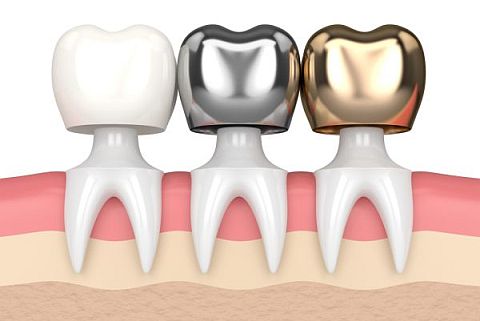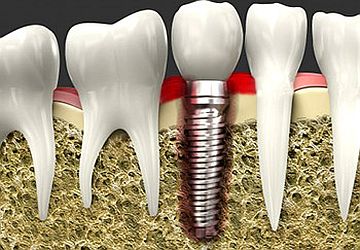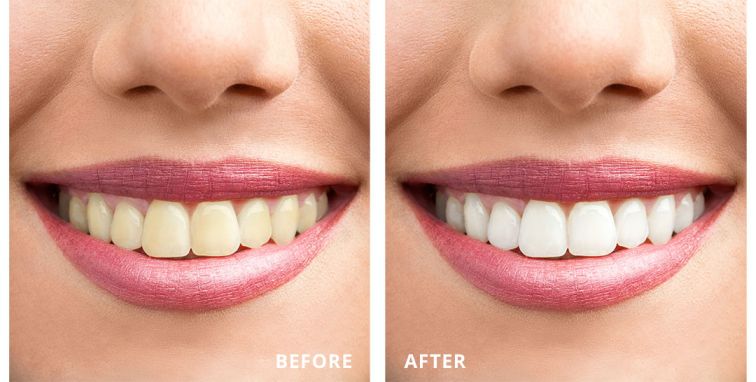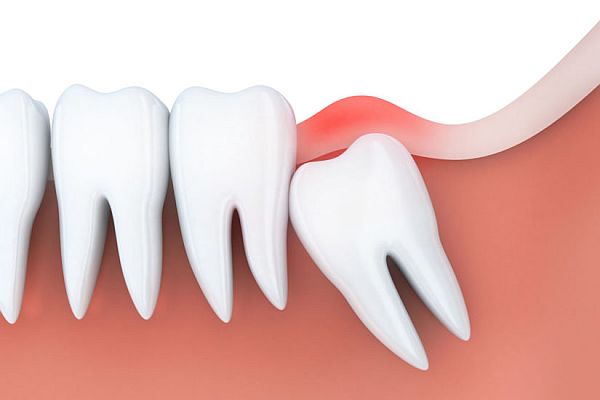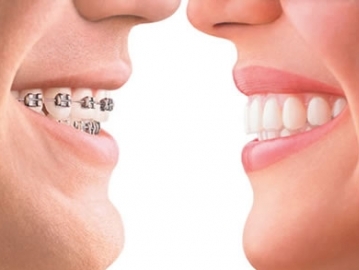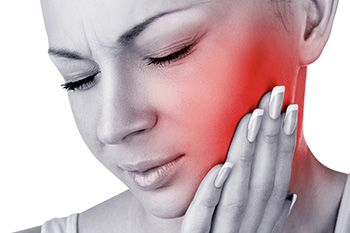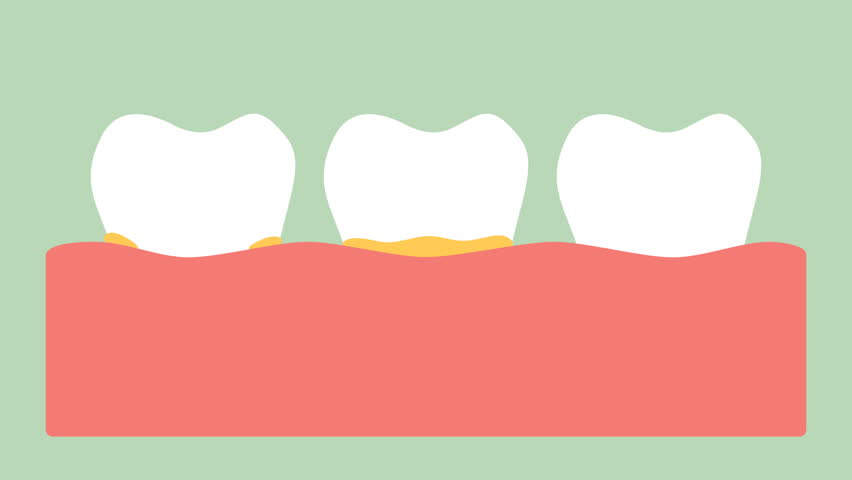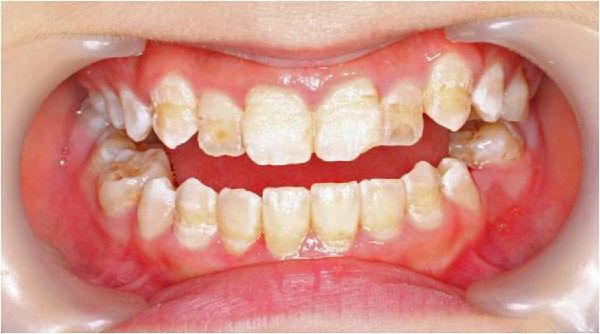Teeth whitening: how is it performed and what side effects does it have?
Dental whitening is one of the most demanded treatments at dental clinic in saraswati vihar currently because the aesthetics of our mouth and smile is a very common concern.
Many people are not satisfied with the appearance of their teeth so they resort to perform a teeth whitening. Although it is normal that we come up with a series of doubts before doing it.
One of the most frequent doubts is the concern about the effectiveness of this procedure, as well as the side effects that it could have. The best dentist in Delhi explains all the questions you have to know about these aspects.
How are teeth whitening treatments performed?
According to the dentist in Delhi, the purpose of tooth whitening is to clarify the whiteness of the enamel of the teeth, one or more shades that, over time, lose their original colour. We can find two different methods for this:
First, we can find outpatient whitening . This treatment consists of making splints with the patient’s measurements. In them, with a syringe, whitening agent is applied. For the treatment to be effective, the patient will have to take them for about four hours a day, approximately, to be effective.
On the other hand, combined teeth whitening consists in joining the treatment of splints with a session of cold light lamp or laser in the dental clinic in Pitampura. This use enhances the action of the bleach. In this way, better results are achieved and will last longer in time.
In both cases, the bleach penetrates through the pores of the enamel, reducing the colour of the tooth surface in several shades. Although we speak of a minimally invasive treatment, some people can suffer certain side effects that can be annoying to the patient.
What are the possible side effects of tooth whitening?
Teeth whitening is a very simple and painless treatment, although a series of side effects can appear.
- Dental sensitivity : this is the most frequent effect among patients. By penetrating the bleaching agent to the dentine through the pores, this effect can be experienced. If after suffering tooth whitening you suffer, do not worry because it is a very common symptom and it is temporary.
- Gum irritation : the gums may be exposed to the bleaching agent and suffer irritation. This will disappear when the product stops being in contact with them. Although if the inflammation is very acute, it is preferable to interrupt the treatment.
- Burns : when products with a higher concentration than recommended are used, they can become burns in areas such as the lips or gums, and even cause abrasion of the tooth enamel. Although this effect is not frequent when performing dental whitening under the supervision of a dentist.
- Allergic reactions : some patients suffer allergic reactions to the components of the bleaching agents. If this happens, the procedure has to be stopped immediately.
Can I reduce the risk of these side effects?
Following a series of steps and taking into account some aspects such as nutrition, consumption habits or improve our oral hygiene can prevent us from the possible side effects of tooth whitening.
Use desensitizing toothpastes
It is very common to suffer tooth sensitivity with this treatment. If this occurs, use a desensitizing toothpaste . This will close the open pores of the enamel, which leave the dentin exposed, and reduce the sensation of tooth sensitivity, recommends oral surgeon in Pitampura.
Pay attention to your eating habits
According to the dentist in saraswati vihar, one of the ways to combat tooth sensitivity is to avoid very cold or hot foods and drinks. In addition, feeding can also help to stabilize the results of the treatment.
Reduce the consumption of beverages such as coffee, red wine, or tea to maintain the whiteness of the teeth. Increase consumption of beverages and white foods such as water, rice or milk during treatment to avoid staining.
Always attend specialized clinics
We can find many bleaching products in the market. They are cheaper and, supposedly, promise to be effective. It is important to go to a dental clinic in which a specialist is responsible for monitoring the treatment. Thus, the risk of suffering side effects will be lower because in dental clinic in Rani Bagh, the bleaches are of quality and are not abrasive so that the tooth enamel is not damaged, says dentist in Rani Bagh.
Custom-made splints are designed to reduce contact between the bleach and the gums. This prevents irritation and the process will be more comfortable for patients.
Finally, it is important to know that only whitening treatments can be done for those whose mouths have a perfect state of health. The specialist will be the one who will check the state of this and verify that there are no caries or other periodontal diseases.
As a general rule, before performing the treatment, professional oral hygiene is usually carried out.
Avoid home remedies as much as possible
On the Internet we can find a variety of remedies that usually indicate the effectiveness of the same teeth whitening. These treatments are carried out with abrasive products that can damage the tooth enamel.
How can I get longer teeth whitening?
Getting the whitening result to last over time depends on many factors . Among them, highlights aspects such as habits of consumption and dental hygiene or the degree of enamel staining.
Not in all cases, whitening is an effective process, since it will depend on each patient. For example, those who have stained teeth due to tetracyclines, whitening is ineffective to remove stains.
On the other hand, smoking is a negative habit for the colour of teeth. If you have a teeth whitening treatment and you have this habit, the results will come back much sooner.
In addition, it is necessary to know that when we undergo a treatment of this type, maintenance of the whitening should be done periodically. As a general rule, this maintenance is usually done once a year if the enamel shows spots. If there are no spots, they can be done more sporadically, as recommended by the specialist.
If you have any questions about the side effects of this treatment or want to do it, do not hesitate to contact us.
Periodontal Disease: what it is and what we can do?
What is periodontal disease?
According to best dentist in Delhi, Periodontal disease is an infectious disease that affects the oral tissues, especially the tissues that support the tooth. Little by little they accumulate plaque, so that those teeth lose the supporting tissue. As a result of that, the teeth begin to move and, if not detected in time, they end up falling.
Is tooth loss one of the main consequences?
Exactly. With the loss of teeth our quality of life worsens because we eat worse and food does not taste the same. After all, everything starts from the mouth, says dentist in Delhi.
What other consequences would periodontal disease have for general health?
By having discomfort in the mouth, we do not eat well, and bad digestion occurs. From there, everything affects us. From cardiovascular problems to uncontrolled diabetes. It has even been proven that premature babies are very underweight because the mother has had periodontal disease, says dentist in saraswati vihar.
Is it reversible?
What we can do is stop periodontal disease. What we cannot do is recover the lost tissues, but we can achieve, with certain levels of tissue, that these teeth remain in the mouth and there is no tooth loss, suggests Oral Surgeon in Pitampura.
How is periodontal disease treated?
The first thing to do is go to a Dental Clinic in Rani Bagh that has a periodontist to treat us. It is the Dentist in Rani Bagh who is responsible for treating periodontal diseases. Depending on the case, there will be patients who need basic cleaning techniques and specific care, and others who need a microbiological study to know exactly which bacteria are progressing in their mouth and are eating those tissues.
In summary, the important thing is that a periodontist assesses it and determines the type of treatment that the patient must perform depending on the degree of the disease.
Effectively. Is that even children in their baby teeth can have periodontal disease? According to Dentist in Pitampura, there are many types of periodontal diseases: some milder and others more severe, and not all have the same treatment. Some people need more, others less. There are people who need antibiotic or antimicrobial therapies, and others who only need a few mild treatments.
To finish, how can we identify periodontal disease?
Before the onset of periodontal disease, the first sign is gingivitis. This gingivitis is shown with a reddening of the gums and, apart from a bleeding that tells us something is happening in the mouth. The most important thing is to go to the Best Dentist in Pitampura since we see an abnormality in our mouth.
Dental Check-ups: why are they so important?
Many people only remember to go to the dentist in Delhi when they have problems in the mouth. However, this bad habit of not having dental check-ups could be harmful not only for your dental health but for your general health, says Dentist in Rani Bagh.
In fact, the mouth is a window into the general health of the body: it reflects the state of general health. Certain diseases can be discovered through a Comprehensive Oral Exam at Dental Clinic in Rani Bagh, even before the symptoms appear in other parts of the body. In addition, in the mouth we can see some injuries that can alert us about vitamin deficiencies, lack of minerals or deficient nutritional states.
According to the best dentist in Delhi, the association between oral microbial infections such as periodontal diseases and systemic disorders is not a new concept. Today we have a large amount of evidence that highlights the association between oral health and a wide variety of diseases.
Diseases of the gums
Gums should not bleed when you brush your teeth or floss. The bleeding in these cases evidences a possible disease of the gums.
Gingivitis, the milder presentation of gum disease, arises as a response to the plaque that is formed by bacteria between teeth and gums. If the plaque expands, the immune response increases and can destroy the tissues and bones in the mouth, causing spaces between the teeth that can become infected. In this case, the disease of the gums is called Periodontitis, which can become chronic, says Oral Surgeon in Pitampura.
Teeth falling
Both tooth decay and gum disease can cause tooth loss.
Bad breath or halitosis
According to dentist in saraswati vihar, bad breath affects about 65% of the population. Halitosis can be a symptom of many diseases, but the number one cause is poor dental hygiene.
Complications in pregnancy
Gingivitis affects between 60 and 70% of pregnant women. When pregnant women have serious dental problems, their babies are more likely to develop tooth decay. In addition, poor maternal dental health is also associated with advanced births and low birth weight, says Dentist in Pitampura.
Diabetes
Dentists have long known that diabetes is a risk factor for periodontitis. However, recent studies indicate that this relationship could be bidirectional. Poor dental health can also be a risk factor for insulin resistance and diabetes. Some studies have even indicated that in patients suffering from both diseases, resolving periodontitis can improve the control of diabetes.
Stomach ulcers
In people with periodontitis, the plaque that forms in the spaces below the gums can be transformed into a reservoir of Helicobacter pylori, the bacteria responsible for stomach ulcers. This bacterium can be transmitted orally, and large epidemiological studies have found a relationship between periodontitis and positive test for this bacterium, which is also a risk of stomach cancer.
Cancer
Gum diseases and dental problems are also associated with the human papilloma virus, HPV, which causes almost 80% of oral cancers. Other research has suggested that periodontitis can promote the growth of cancer cells in the mouth.
As you can see, dental check-ups do not just help you
- Maintain an attractive and healthy smile
- Maintain the organism’s functionality
- Save costs in dental treatments
They are also essential for your general health.
Orthodontics, is it also for adults?
Until very recently, most people thought that wearing orthodontics was only for children and adolescents. However, this belief is false, since, in general, whenever a mouth is healthy, dental braces can be placed, whatever the age of the patient. Nowadays, it is very common to see adults with braces, for example, with the aim of improving their smile or correcting the bite.
Most of what they get is to improve their oral health and, in addition, increase their self-esteem.
These are some of the reasons why, whatever your age, it is good to follow an orthodontic treatment if it has been recommended by the best dentist in Delhi:
- Because teeth can move at any age
Whether due to illness, injury or by nature, teeth can begin to move at any age. Even if you’ve had your teeth aligned throughout your life, now your smile may look crooked. Perhaps, in your case, you have taken orthodontics in your childhood and now you may need some orthodontic correction by orthodontist in Pitampura after so many years.
- To avoid serious problems in the teeth and gums
Having a bad bite or misaligned teeth is very common in adults. These problems favour plaque and food debris remaining between your teeth, which is a risk factor for the onset of periodontal disease or gum disease. The consequences could also be translated into irregular wear of the tooth enamel, the appearance of caries, recession of the gums, loss of bone and teeth … Among other things, a bad bite or misaligned teeth could favour the appearance of the syndrome of the temporomandibular joint, a disorder that causes discomfort in the jaw, says dentist in Pitampura.
- To avoid other health problems
If your teeth are not aligned or your bite is not correct, you may not face only oral health problems if you do not go to the dentist in Rani Bagh to solve them. The temporomandibular disorder mentioned above, for example, causes pain in the jaw, in the ear and in the temple, which can affect the quality of your sleep hours. A dental malocclusion does not allow you to chew food properly, which could cause digestive problems. What’s more, periodontal disease is related to health problems such as diabetes, heart disease and heart attacks.
- Bring orthodontics: because now they are better and less visible
Orthodontics has evolved a lot over the years. That “mouth full of iron” is a thing of the past, since nowadays metallic orthodontics is much more discreet. In addition, now there is also porcelain orthodontics, with a colour very similar to that of your teeth. On the other hand, there is lingual orthodontics, which is placed inside the teeth. Finally, there is the invisible orthodontics, with Invisalign, which has no metal or wires, which has made it one of the most demanded treatments at dental clinic in Pitampura. Your dentist in Saraswati Vihar will be the one to help you choose what type of orthodontics is best for you.
- Because life expectancy has increased
Every time we live more years and, want or not, we all prefer to keep our teeth for life. Therefore, it makes sense that we invest money in aligning our teeth if that increases the chances of having good dental health, good general health and a better appearance for as long as possible. More and more adults are choosing to undergo orthodontic treatment.
- To improve your smile
Last but not least, many people choose orthodontics to improve their smile. The smile is one of the first things that people who cross your path see. A beautiful smile could make a difference in both the professional and social fields. It’s worth doing a little effort to get that smile you’ve always wanted to wear. It will increase your confidence in yourself and, in addition, it will improve your quality of life in an incalculable way.
Find out about orthodontic treatments at dental clinic in Rani Bagh. In your first consultation, the dentist in Delhi will assess with you the different options to confirm which one is the best for you. Because wearing orthodontics is not just for children and teenagers, it’s also for you!
Problems of Dental Implants
A Dental Implant in Rani Bagh is like the root of a tooth that is placed by means of a surgery in the maxilla, under the gum, it is made of titanium, which will allow the dentist to embed the replacement tooth or the bridge where it is required. They are not removed like dentures and are beneficial for oral health in general, since they do not need to be attached to another tooth, such as bridges. Dental implants are an excellent option when a tooth must be replaced, since patients feel a great satisfaction and success, but dental implants can also cause certain problems in some cases, says best dentist in Delhi.
What is required for a dental implant?
- According to dentist in Delhi, you must have a healthy gum and adequate bone where you can support the implant, since a damaged gum cannot withstand the titanium that is placed from the gum to the bone.
- If you have a very thin or soft bone and cannot maintain the implant, this can be seen through X-rays, before the placement of any type and dental implant, states Dentist in Rani Bagh.
Problems of dental implants
According to Best Dentist in Pitampura, problems with dental implants can occur in different stages. Which can be:
- Before the dental implant is made: if the place where the implant will be placed does not have enough bone, this procedure cannot be performed. It requires that you have enough bone in order that the implant can be placed firmly, otherwise it would move. To correct the problem, graft can be performed, for the realization of this procedure there are many techniques and materials that help the rapid growth and development of bone in a healthy and uncomplicated manner, says Oral Surgeon in Pitampura.
- During the placement of the implant: In this stage there are usually no complications, since the process is very effective and the danger of some very low difficulty happening. If there is complication, there should be wrong manoeuvre during the process. The implants are made of titanium which adapts perfectly to the bone structure of the human being, without causing any discomfort, says dentist in saraswati vihar.
- After performing the dental implant: There are problems due to the bad treatment of the teeth or when an adequate hygiene is not carried out and no treatment is carried out, this can deteriorate, and this can cause damage to health. Another problem that may arise is when the implant is integrated into the bone, at this time it is required that there is abundant oxygen flow so that the patient does not suffer any discomfort or pain. And it is that a dental implant, for the body, is a strange factor, therefore, it can cause some type of rejection to it, that is why, after being able to place the implant, you must maintain a control with the Dentist in Pitampura, to avoid any kind of reaction harmful to health.
Teeth Whitening or Dental Veneers?
Do you have yellow teeth and are you ashamed to smile? Cannot find how to solve this problem? Currently in the market there are several alternatives, but the most demanding are teeth whitening and dental veneers.
Both treatments at Dental Clinic in Rani Bagh are suitable to eliminate the yellowish colour of your teeth and both help you achieve a more beautiful and aesthetic smile. In this way, the choice of one or the other depends on the case of each patient and it must be a qualified professional who is in charge of advising you which is the most appropriate.
In this sense, the treatment of teeth whitening consists of the application of chemical products on the surface of the tooth that, due to an oxidation process, causes the tone of the teeth to become lighter. These procedures have to be supervised by a dentist in Delhi since the chemical agents used can cause abrasions or damage to the gums. At Dental Clinic in Rani Bagh we use cold light whitening, thanks to which the patient can clarify several tones in a single session and with the guarantee of taking care of both the teeth and the gums.
Although there are different types of whitening, the best results are obtained at the dental clinic in saraswati vihar, in fact, you can get results in just one or two sessions because the concentration of whitening gels is much higher, around 35%.
This treatment is not recommended if you have:
- thin little enamel
- tooth sensitivity
- cavities
- periodontal disease
For their part, dental veneers are very thin porcelain sheets that are placed on the front of the tooth. This treatment brings a much whiter colour to the surface of the tooth. However, it extends the benefits since it allows to correct defects in the shape of the teeth, making them more homogeneous and therefore more attractive, says Dentist in Rani Bagh.
According to the best dentist in Delhi, the main advantage of dental veneers is their good result, because thanks to materials such as composite or ultra-thin veneers of e-max you do not need to carve the tooth. In addition, they are very resistant and do not wear out so they stand the test of time.
Causes of tooth colouring
Dental coloration is one of the main reasons why the majority of the population opt for teeth whitening treatments or dental veneers to recover the whiteness of their smile.
In this sense, the dentist in saraswati vihar, explains what are the main causes of tooth colouring:
- Inadequate diet: Abuse of food such as coffee, tea, cola drinks, red wine or citrus juices.
- Harmful habits: tobacco abuse.
- Medicines: Constant consumption of tetracyclines, doxycycline (antibiotics), antidepressants, antihistamines, mouthwashes with chlorhexidine or excess fluoride.
- Bad oral hygiene: Do not brush your teeth after each meal involves the accumulation of plaque and tartar and eventually the appearance of spots.
You know, if you want to have a perfect white smile you have to take care of your teeth. If you already have spots, opt for teeth whitening or dental veneers, but always without forgetting that the choice of one or the other treatment should be recommended by a professional. Go back to smiling at life!
Dental Crown
What is the Dental Crown?
The dental crown is basically a dental cover that is made to measure. The result is a prosthetic tooth similar in shape and colour to the original tooth. With dental crowns we can cover a diseased tooth completely, for different reasons. It is a simple procedure, which presents a quite natural appearance in the smile. Nobody will realize that you have a case, says dentist in Delhi.
When do we turn to dental crowns?
- Coating a tooth: the dental crown is perfect for covering a damaged tooth. Generally, after carrying out an endodontics the custom-made sleeve is placed in the Dental Clinic in Rani Bagh.
- Implant crown: the crown is also used to complete the treatment of Dental Implant in Rani Bagh after tooth loss.
- Aesthetics: dental covers are also used to cover a tooth or tooth that aesthetically does not look nice.
- Dental bridge support: Dental crowns can be used to support a bridge when there is a lack of teeth around the sheath.
Types of dental crowns
- Porcelain
At dental clinic in saraswati vihar the dental crowns that we usually recommend are ceramic or porcelain. They present almost perfect similarities to the natural tooth and provide very good resistance.
- Resin
Resin crowns are not usually the choice of Dentist in Rani Bagh. As a provisional dental cover, while the final crown is made they are fine, but they are not strong enough as other types of dental crowns.
- Zirconium crowns
In terms of price, zirconium dental crowns are the most expensive. But they are also the best properties, both aesthetic and mechanical present. Zirconium has characteristics very similar to natural tooth enamel, as they offer a unique transparency. We like to recommend this type of covers to give support to the most visible dental pieces, since their properties are perfect. In addition, zirconium is one of the most avant-garde and resistant materials used in dentistry, says dentist in saraswati vihar.
- Metal crown
These dental covers are made with gold, nickel or platinum. As for resistance, they are great, but they are not aesthetic at all. Thanks to their properties they are crowns for life, although they are used very little in dental clinics.
- Porcelain and metal
Resorting to this combination of materials is an alternative, since it offers the advantages of both types of dental crown. Your choice is contingent upon the state of the tooth to be restored. Sometimes, when the tooth is severely damaged, this solution improves adhesion and functionality. The base of the crown, which is placed on the tooth root, is metallic and the most visible part is made of porcelain. It is not usually an optimal option when there is gingival retraction, since the metallic line would be seen on the gums.
How can we keep our crown in good condition?
According to the best dentist in Delhi, the most important thing is to maintain good dental hygiene. If the teeth or bone that hold a bridge or an implant are in poor condition due to periodontal disease, for example, we will probably lose the crown or the bridge will loosen. In addition, it is essential to periodically visit the dentist for a review of the condition of our crowns or bridges.
Can dental implants cause problems?
If you have to put dental implants and you have doubts about their possible complications, we will discover the most common situations you can find.
Implants are one of the most popular dental solutions today because they allow you to replace a tooth with a new one in perfect condition. But you have to know that dental implants can give certain problems. It is not something that happens in the vast majority of patients, but nevertheless, it never hurts to know the possible complications that may arise.
The most common problems of Dental Implant in Rani Bagh
First of all, it is important to note that 95% of dental implantology cases are successful. Therefore, when we speak of "complications" we refer to situations that take place in the large minority of cases, says Dentist in Rani Bagh.
However, it is interesting to know the possible problematic cases that may appear after the dental operation has been performed. Here we discover them:
Normal post-surgical reactions
After having undergone the operation at Dental Clinic in Rani Bagh, some conditions can appear that are easy to treat and solve. Some of them are the following:
- Pain in the nerves of the gums
- Inflammation of blood vessels
These are the most common situations that occur after the operation and that can be easily treated in the dentist's office.
Post-operative complications
Rejection of the implant
However, there are other types of complications that are somewhat more serious, although, as we have already pointed out, they only affect 5% of patients. One of them is the rejection of the implant, that is, the body does not finish accepting this new piece and recognizes it as something strange. Therefore, it will try to expel it with different procedures, says best dentist in Delhi.
In these cases, you have to choose to remove the implanted piece and look for other methods to take care of oral health.
Allergic reaction to the implant
First of all, it is important to note that the implants are made of titanium. This is a biocompatible material with our body and, therefore, it is very rare that an allergic reaction occurs. But it's not impossible, says Oral Surgeon in Pitampura.
According to Orthodontist in Pitampura, there have been cases of patients who have experienced reactions to some components of these implants. In these cases, the piece should be removed and counselled by an allergist to determine what is causing this allergy.
Weakening and loss of bone structure
Another problem with dental implants is that they make the bone that supports and supports them weaken when affected by periodontal disease in the same way that it affects the teeth. For this reason, before making the implantation, it is important to check if there is enough bone for the operation, says dentist in Saraswati Vihar.
Implant rupture
It may also be the case that the implant placed breaks with time. It should be noted that this situation is very rare, since the material with which the implants are manufactured are increasingly resistant. However, it can happen that the metal bends and breaks over time. In these cases, it will be enough to replace this piece with a new one at dental clinic in Saraswati Vihar.
Tips to avoid complications with dental implants
According to Dentist in Delhi, to avoid suffering from any of the complications that we have just indicated, it is important that you be careful with your implants. For this reason, it is recommended that you follow the prescription of the dentist to the letter and, if necessary, take analgesics or anti-inflammatories to calm the pain.
In addition, it is recommended that you follow these hygiene guidelines that will help you care for and protect your implants:
- Extreme oral hygiene: you have to brush your teeth 3 times a day
- Use flossing once a day
- Make mouth rinses also once a day to avoid tartar
- Do not smoke during the first weeks of the operation
- Do not eat foods too sugary
- Go to the dentist on a regular basis and to the maintenance reviews of the implants
Different types of dental treatments
The Dental Clinic in Pitampura usually have teams of professionals of proven experience and highly qualified for modern and painless dental treatments, which allows patients to receive global attention. The dental clinic in Rani Bagh has the most modern technology with which it gives an excellent service, professional and cordial to give the maximum guarantee in all dental treatments.
There are many treatments offered by the best dentist in Delhi in practice such as dental implants, orthodontics, pediatric dentistry, teeth whitening, oral surgery, periodontics, endodontics and dental prosthesis ....
In addition to all types of dental prostheses, manufactured with 100% biocompatible metals and those manufactured without metal, which reduce allergies and intoxications. Dentistry is one of the most technologically developed biomedical areas. That's why the professionals in this sector keep up to date by taking courses of the highest level and recognized by the best college in India.
Do not hesitate to visit your trusted dentist in Delhi, they will offer you quotes according to your treatment. The experience of these professionals will inform you at all times of the most suitable treatments for your oral health.
Common dental treatments
Dental implants
Implantology, a branch of dentistry dedicated to dental implant in Pitampura. A natural tooth has two main components: the crown that is the visible part of the tooth and the root that is the part of the tooth lodged in the jaw below the gum.
A dental implant acts like an artificial root of a tooth because it is inserted into the jaw, either the maxilla or the jaw. It often has the shape of a screw and is made of titanium or a titanium alloy.
The dental implant is used to replace one or more missing teeth.
Dental implant in Rani Bagh can be considered as a dental treatment plan when a patient has one or more missing teeth. A dental implant alone cannot replace a lost natural tooth. A screw should be placed over the implant once it has been inserted into the maxillary bone.
Depending on the number of teeth that will be replaced, a crown, prosthesis or artificial bridge will be manufactured and installed on the screw. If the patient only needs one tooth, a single crown is enough. If you have to replace several teeth, there are many options: use a single implant with several crowns welded by a bridge or a prosthesis or use several implants with separate crowns. This choice depends on the patient, according to the treatment plan recommended by the dental implantologist in Pitampura.
Materials such as composer and ceramics that are much more aesthetic and 100% biocompatible
Teeth whitening
Would you like to show a healthy and bright smile? Your teeth are yellowish, opaque, grey. Sign of passage of time, inheritance or consequence of external factors, dyschromia (discoloration) can be improved.
Indeed, it is possible to whiten the teeth thanks to treatments and aesthetic cares perfectly effective, without pain and with immediate results. The dentist in Pitampura performs this technique to return your smile that will know exactly what to do to restore its whiteness.
What is tooth whitening?
Teeth whitening in Pitampura is a dental treatment that consists of restoring the original tone of your teeth or a shade lighter than the current one. This is different from one person to another. This is why the dentist will first use a color chart to establish the whiteness goal that must be achieved on a case-by-case basis. It is the security of rediscovering a personalized smile, in harmony with your face and your complexion.
The term whitening has been used for a long time to define the action of restoring the luminosity of a denture. There is also talk of "clarification" to designate this care, which is undoubtedly closer to reality. It is about obtaining the best result according to your wishes and our advice.
When should you start a teeth whitening treatment?
Many factors play a role in the evolution of tooth color. First, aging; over time, the enamel, the outer layer of the tooth, decreases in thickness and reveals the naturally yellow dentin stain. Oral hygiene is also involved in yellowing; the build-up of plaque and plaque distorts the color of the teeth.
Whatever the reason for the original loss of color of your teeth, there is a therapeutic solution to make them whiter. First take the advice of a professional who will know how to establish the diagnosis of your teeth and will guide you correctly on the treatment to adopt.
Orthodontics
What is orthodontics?
Orthodontics is the specialty of dentistry dedicated to the prevention and correction of anomalies in the alignment and positioning of teeth and jaws for functional and aesthetic purposes.
What causes misalignment of teeth and jaws?
The bad position of the teeth and the jaw can be caused by several hereditary factors or develop over time, such as the premature loss of milk teeth or permanent teeth (not replaced). In addition, certain bad habits such as thumb sucking, oral breathing caused by the presence of large adenoids or tonsils or by nasal blockage, atypical swallowing (abnormal position of the tongue when swallowing), biting of the lips or any other object (pencil) can affect the position of the teeth and the shape of the jaws.
Why a dental orthodontic treatment?
Health Healthier teeth and gums
- The proper alignment of the teeth facilitates cleaning, reducing the risk of plaque retention, decay and periodontal (gum) disease. So, keep your mouth healthy longer.
- Function Improves chewing and speech
- The position of the jaws and teeth is closely related to the ease of chewing and therefore to have an adequate digestion. The alignment of the teeth and the position of the lips affect the pronunciation, phonetics and speech.
- Well-being Greater comfort and longevity
- A good occlusion causes less stress on the teeth, bones, muscles and temporomandibular joints. A bad occlusion can make the teeth grind and squeeze (bruxism). Bruxism is often the cause of wear and tear of existing teeth or restorations, as well as muscle fatigue and pain in the face, head and neck.
- Aesthetics: A beautiful smile-a better self-esteem
- Straight teeth and a beautiful smile will make you feel less embarrassed and more confident. Another reason to smile
What can correct orthodontics?
- Inadequate spaces between teeth or overlapping teeth
- A smile that shows too much gum
- The difficulty of closing the lips completely at rest
- The lack of harmony between the upper and lower jaws: one maxilla too far forward or too much behind the other.
- Shape of the face: a chin too advanced or too far back, a too long face or an asymmetry of the mouth.
When should orthodontic treatment begin?
From an early age, when a problem is detected, it is often important to address it quickly. In this way, with small interventions, often with removable appliances, an anomaly in the position of the teeth can be corrected to avoid further treatments later.
Sometimes it is important to correct a growth problem in the jaws. These interventions are necessary before the end of the growing season (usually between 11 and 14 years).
Once the growth is completed, orthodontic treatment is available for all ages.
A thorough examination will be necessary to determine the best time to start, the duration and costs of dental treatment, the technique that suits you and, of course, your dentist in Rani Bagh will answer all your questions related to dental treatments with orthodontist in Pitampura.
How long a dental whitening last?
It will depend on the characteristics of each person and their life habits, but there are some keys to maintain their effects.
Dental Health
Our relationship with the dentist has been modified during the last years. Before, going to one was synonymous with having a dental problem (such as tooth decay or loss of parts) or gums (gingivitis, periodontitis, etc.). Now, in an effort to have a perfect denture, they are used to receive aesthetic treatments such as invisible orthodontics or teeth whitening. The latter have become one of the most demanded treatments in Dental Clinic in Rani Bagh.
Dental whitening, like other treatments, is not permanent. Its duration will depend on the characteristics of each person and their lifestyle habits. Typically, the results of tooth whitening will last at least 12 months, but with complementary treatments, such as the teeth whitening booster, the results can be maintained in the longer term, says best dentist in Delhi.
Strengthening teeth whitening, the secret for results to last over time
According to dentist in Delhi, the duration of teeth whitening results will vary depending on the type of treatment applied (by photoactivation, combined etc.). The whitening reinforcement treatment is carried out by the patient in his own home, with a few splints and a whitening gel that is placed in them according to the indications previously indicated by the dentist. This whitening reinforcement is more economical than a new whitening treatment and its effectiveness is high.
The dentist is the one who guides the time that the patient must place the splints and for how many days it will be necessary to apply the teeth whitening reinforcement treatment. If these recommendations are followed, the results of the teeth whitening performed many months ago will be maintained in the long term, says Dentist in Rani Bagh.
Habits of life that will help you maintain the effects of your whitening
- Avoid those foods or drinks that dye your teeth: red wine, tea, cola drinks or coffee can dye your teeth. But also, some foods that include artificial colours like paellas, fruits like strawberries or blueberries and sweets like candies or coloured popsicles. The coloured compounds of these foods are absorbed by the enamel producing stains. In case you take them: use a straw to keep the liquid from getting in contact with the teeth, rinse your mouth with water after doing it and, if you cannot, chew gum without sugar.
- Do not smoke: it is proven that tobacco is one of the main agents that stain your teeth, and it is likely that you have performed a teeth whitening to counteract its effects; therefore, if you want to keep your white teeth for longer, consider abandoning that habit which, in addition to staining your teeth, is responsible for other diseases of the mouth, such as halitosis or oral cancer.
- Maintain proper dental hygiene: wash your teeth after every meal and before going to bed. Ask your dentist to recommend a toothpaste and mouthwash that does not include colour ingredients.
- Plan with the dentist your periodic reviews: after the treatment there may be some dental sensitivity, so it is important to review a few weeks after confirming that this problem has been temporary. The remaining revisions will be made after 6 months.
Drink plenty of water so that your body is hydrated and maintain proper dental hygiene brushing your teeth regularly and using dental floss and mouthwash. This routine will help keep your mouth free of plaque, bacteria responsible for tooth decay and stains.
And remember, the Teeth Whitening in Pitampura that your dentist applies to you are safe for your oral health and effective, but the main person responsible for them working is you.
Wisdom Teeth Removal
Should I remove my wisdom teeth?
The wisdom teeth, wisdom teeth or third molars are the last teeth to develop and usually appear between 17 and 25 years. In general, they do not need to be extracted if they develop in line with the rest of the teeth, in healthy conditions, says the best dentist in Delhi.
However, if you're going to keep your wisdom teeth, you should get one professional cleaning, reviews regular and periodic X-rays to monitor any changes. In most cases, the pieces are completely misaligned and require extraction.
What happens if the wisdom teeth are misaligned?
Misalignment leads to problems with the adjacent teeth, the jaw, the nerves and also with the rest of wisdom teeth, as they are surrounded by the soft tissue of the jaw.
In fact, if a partial rash occurs and is not corrected, this can cause infections and cause pain, swelling or stiffness of the jaw, among others, says dentist in saraswati vihar.
How do I know if I have wisdom teeth?
To know the state of your wisdom teeth, it is necessary to perform an x-ray to evaluate the state and alignment of the teeth. In general, dentist in Delhi or oral surgeons recommend removing the teeth even before problems develop. In this way, a painful extraction is avoided in the future.
It should be noted that extraction is easier in younger patients, since the roots are not yet fully developed and the bone is less dense. In older people, the recovery time tends to be longer.
When is an extraction necessary?
In general, wisdom teeth should be removed at dental clinic in saraswati vihar when:
- There are infections and / or periodontitis.
- There are cavities that cannot be treated.
- There are cysts, tumours or other pathologies.
- There is damage to the adjacent teeth.
- His mouth is not big enough and the jaw does not have space for an extra set of molars.
How is extraction of the wisdom tooth made?
Once it has been determined that a wisdom tooth is problematic, it should be removed by an oral surgeon or a qualified general Dentist in Rani Bagh. The local anaesthetic is administered to ensure that the tooth can be extracted without any discomfort. Many people opt for conscious sedation (a state of sleep, where pain signals are blocked) so they have little or no memory of having wisdom teeth removed.
Then a minor surgery is performed at Dental Clinic in Rani Bagh to remove the tissues and bone around the wisdom tooth, thus facilitating tooth extraction. Finally, several stitches are made to close and start healing of the tissue.
The recovery usually takes between 3 to 5 days and it is normal to have some discomfort; considering the surgical procedure performed. To help relieve pain, the dentist will prescribe medications to relieve postoperative symptoms. Also, it is recommended to eat soft foods for a few days and avoid spicy foods, tobacco and alcohol.
Why is it important to have teeth aligned?
In addition to its obvious cosmetic advantages, the alignment of the teeth also influences our health, says Oral Surgeon in Pitampura.
Dental Health
There is no doubt that a smile in which white, unpolluted and well-aligned teeth are exhibited causes a very good first impression, before which the aesthetic objective is the one that generally guides people to undergo orthodontics. However, taking care that all the teeth are in place and that they fit together when we close our mouths is also an important health issue.
Thus, despite the fact that an orthodontic treatment at Dental Clinic in Rani Bagh can be long and uncomfortable, with it we not only invest in presenting ourselves better to others, but also in improving our oral health and, therefore, saving dental treatments in the future.
Then we will discover some of these advantages for our health, the two following aspects being the most important.
Hygiene
The mouths of some people are too small and this causes the teeth to crowd and move to crooked positions.
The fact of aligning the teeth reduces the possibility of suffering periodontal disease, since it facilitates the cleaning of the teeth, especially of the interdental spaces. Having well-aligned teeth also minimizes the build-up of plaque on the teeth and is a tool for the prevention of tooth decay.
Oral hygiene not only results in good oral health, but in general health: poor oral hygiene can cause Alzheimer's, cancer and heart disease, among other health problems, says best dentist in Delhi.
Bite
According to dentist in Delhi Occlusion refers to the position of the teeth and the way they adjust the upper and lower teeth (the so-called bite). The upper teeth should fit a little over the lower teeth, and the tips of the molars should fit in the grooves of the opposite molars.
A defective occlusion usually has a hereditary origin, but there are other factors that can lead to it, such as maintaining some habits during childhood: sucking your finger, pressing your teeth with your tongue or using a bottle or pacifier after three years.
Having your teeth aligned correctly helps us, for example, to prevent the upper teeth preventing the cheeks and lips from being bitten and the lower teeth protecting the tongue.
Having the teeth well aligned also reduces the likelihood of bruxism, an affectation that has many negative consequences for the whole masticatory system, such as a progressive wear of the teeth. This increases the risk of rupture of a tooth and can increase the symptoms of temporomandibular joint disorders, says dentist in saraswati vihar.
Finally, a bad alignment of the teeth, in some cases, can lead to poor chewing, which will make it impossible for us to crush the food correctly, leading to digestive problems or a poor assimilation of nutrients.
Treatment
Problems with the alignment of the teeth are easier, faster and less expensive to treat when corrected in time. In addition to the use of orthodontics, some teeth alignment problems can be corrected by removing one or more teeth (for example, if there is a dental crowding). In other cases, the problem lies in the lack of some teeth, so that the solution will go through the replacement of the teeth, using prostheses or dental implants.
You can also use wires, plates or screws to stabilize the jaw bone, or repair irregular or broken teeth by inserting a crown or veneer.
Thus, despite the fact that most people have irregularities in the alignment of the teeth, a regular visit to the Dentist in Rani Bagh will allow them to be detected and, through proper treatment, corrected forever and on time. This way we can show a perfect denture while avoiding future health problems.
What does pain in the mouth depend on?
The mouth is formed by different anatomical structures that allow us to perform chewing, swallowing and speech. Thanks to it the feeding process begins. In it we find the teeth, the soft tissues such as the gums, palate and tongue, and bone. All these structures are composed of nerve fibers that can generate some kind of pain at some stage of our life for different reasons.
For all this, it is important to go to annual check-ups with your dentist in Saraswati Vihar and not only go when you feel a pain in the area. These revisions will prevent these pains in the mouth getting an adequate dental prevention with each revision.
Why does my mouth hurt?
As dentist in Rani Bagh says, the mouth is made up of different structures, all of them innervated by nerve fibers. If you do not have proper oral hygiene accompanied by good eating habits and annual check-ups with your trusted dentist in Pitampura, you may have a risk of damaging some of these structures and suffer different types of pain in different areas.
Any type of infection, inflammation, traumatism or pathological process that you do not know can generate a pain in your mouth, which a priori you cannot know where it is located or what causes it. Therefore, the ideal is that you go to your best dentist in Delhi for confidence to perform a proper exploration and diagnosis to know what is causing that pain and how to fix it.
Different types of mouth pain
In the mouth we can have different types of pain depending on their location and the cause that generates it. According to the different structures of the mouth, we can have different pains:
- Dental pain: it is the most typical. This can be caused by different pathologies such as caries, extensive infections that affect the nerve of the tooth, trauma, sensitivity or even tightening of the teeth (bruxism). This pain can be localized or very irradiated, acute or maintained over time. Normally, depending on the cause, it can be accompanied by inflammation or bad feeling.
- Pain of gums or soft tissues: if there is a gingival pathology such as gingivitis or periodontitis, we can have pain in the gums, accompanied by inflammation or bleeding. In addition, we can also have pain in the tongue due to traumatisms or infections as well as in the retromolar gum due to the eruption of the wisdom tooth; what is known as pericoronaritis.
- Pain in the joint: the temporomandibular joint allows us to articulate our mouth, thus achieving the appropriate movements for chewing, swallowing and speech. It is a very important structure, but sometimes it can be damaged by different pathologies or infectious or inflammatory processes that can produce a lot of pain.
How to relieve this pain? What to do?
These pains are usually very acute and annoying pains, which can even interrupt our daily routine. Therefore, you should know what guidelines or tips you should follow in these occasions:
- The first thing is always to make an appointment and go as soon as possible to your trusted dentist in Delhi to explore and assess your situation. There he will study your case to know the cause of the pain and give the best possible solution.
- You can take some analgesic such as Ibuprofenos or Paracetamol that eliminate this pain transiently. If it still does not happen to you, and your trusted dentist in Saraswati Vihar cannot visit you, you can go to the emergency room doctor to check it and see if there is an infection. If so, you may be given an antibiotic to reduce pain and prevent this infection from progressing.
- There are also some mouthwashes or even gels that you can apply in the area that causes you pain that can reduce inflammation and pain.
The most important thing is to always go to a dentist in Rani Bagh to assess your case and a correct and indicated solution in each case. You should always avoid home remedies, as sometimes they can aggravate the problem more than fix it.
How to prevent pains in the mouth?
The ideal to avoid suffering any type of pain in the mouth is to follow a series of instructions and daily routines in your mouth to prevent any future pathology. Some indications are:
- Follow a correct oral hygiene routine. You must follow the oral hygiene instructions given by your oral surgeon in Pitampura, getting a correct and thorough hygiene of your mouth.
- Complete annual reviews with your trusted dentist in Delhi. You should follow the annual check-ups and professional cleanings with your dentist to avoid any future problems or pathologies.
- Maintains correct eating habits avoiding large amounts of sugar and acidic foods.
- Eliminate bad habits from your routine, such as smoking or biting objects or hard foods.
Prevention is always better than cure, so you should always follow the proper instructions to avoid any future oral problems.
Pyorrhoea: contagion and risk factors
According to best dentist in Delhi Periodontitis, commonly called pyorrhoea, is an infectious pathology caused by bacteria. Many patients think it is a contagious pathology but it is not like that.
Periodontitis affects the supporting tissues of the tooth: the bone, the periodontal ligament, the cementum and the gum. The infection starts in the gum and then it is passed to all surrounding structures so it causes mobility in the teeth, discomfort / pain, redness, bad breath, sensitivity to heat and cold, gums that bleed and in the most serious cases we can find also presence of pus, says best dentist in Delhi.
How is pyorrhoea produced?
In our oral cavity we have many bacteria called saprophytes, these are good bacteria that we need to maintain a microbiological balance in our oral cavity. In cases of genetic predisposition, poor hygiene, diseases or other problems, these bacteria start to proliferate more than normal and then the bacteria become pathogenic.
With the term pathogenic bacteria, we are going to identify all those bacteria that cause diseases like those of periodontitis. In any case, it is important to bear in mind that, if a patient with periodontitis comes into contact with another, it cannot be contagious because you have to have a predisposition to this disease and a patient's own alteration of the oral bacterial flora, says dentist in Sarasvati Vihar.
The bacteria that cause this disease are anaerobic (they live without oxygen) and may already be present in the patient's oral cavity.
Periodontitis does not depend only on pathogenic bacteria, this means that bacteria are not enough for this pathology to occur. Periodontitis is manifested when associated with specific risk factors such as systemic pathologies: diabetes, poor oral hygiene, pregnancy, smoke, alcohol, genetic predisposition.
It is essential to remember the importance of oral hygiene when determining the appearance of this pathology. We must consider the importance of brushing your teeth carefully after meals to break down plaque and keep the surface of the tooth and gums clean. It has been shown that the incidence of periodontal disease increases and is directly proportional to the presence of bacterial plaque. That is, the more plaque there is, the more risk there is of periodontitis and the more serious its manifestation will be with respect to patients who suffer from periodontitis but have good oral hygiene. Although if you have periodontitis have good hygiene ensures to keep the process stable preventing it from getting worse.
What are the risk factors for pyorrhoea?
There are several risk factors that can increase the chances of suffering from this disease. Some more relevant than others. Among the main factors we have genetics, poor hygiene and tobacco.
It is very important to avoid or reduce the consumption of cigarettes, since tobacco is one of the main factors that cause pyorrhoea. The tobacco acts to favour the accumulation of plaque between the teeth and reducing the immune defences that have to act against the periodontal infection.
Alcohol abuse can also be a determining factor in the appearance of pyorrhoea and is considered a risk factor. It has been shown that in patients who take high amounts of alcohol, the disease has a more aggressive evolution.
Another risk factor that can influence increasing the possibilities of appearance of pyorrhoea, are the particularities of the mouth and the mandibular bones. These malocclusions and skeletal deformations make oral hygiene manoeuvres difficult, favouring the accumulation of bacterial plaque, the main responsible for pyorrhoea.
For this reason, Dentist in Rani Bagh insist on the importance of having teeth aligned.
There are also some systemic pathologies that can make the patient more exposed and more prone to suffer periodontal disease. Within these pathologies we can highlight: rheumatoid arthritis, immunosuppression, chemotherapeutic cures, post-transplant therapies.
One of the most important risk factors when we talk about periodontitis is genetics. Patients with close relatives who suffer from this pathology are more likely to suffer it. There is, in fact, a genetic predisposition to pyorrhoea and this factor is not easily modifiable.
Conclusions
Periodontitis is a pathology that affects teeth and gums. It is not a contagious pathology and depends on factors such as bacteria, genetic predisposition and oral hygiene. There are also other factors that can increase the risk of periodontal disease. Oral hygiene and periodic check-ups to the Oral Surgeon in Pitampura are essential to prevent the onset of the disease or prevent oral problems.
Enamel hypoplasia: what is it and how to treat it?
Dental enamel is the most superficial and external layer of the tooth. It is formed by hydroxyapatite, which is a set of calcium crystals that form this tooth enamel and which are the hardest and most resistant parts of it. This layer is translucent, so the one that provides the characteristic white color of the teeth is actually the inner layer and not the enamel. This dental enamel can present some diseases, among which the enamel hypoplasia, which is characterized by an abnormal or insufficient enamel development.
What is enamel hypoplasia?
Dental hypoplasia is a dental problem in which the enamel has not developed properly. It is a dental alteration that normally occurs in the formation of the tooth, causing a defect in the formation of the enamel of the teeth. As this occurs during the formation of the tooth, usually, dental hypoplasia appears already before the eruption of the pieces, says dentist in Rani Bagh.
With what signs does it manifest?
Dental hypoplasia, as we have said, is a problem in the development of enamel. This leads to the generation of a tooth with enamel deficiency, which manifests itself with very characteristic alterations:
- Grooves and fissures in the teeth.
- Yellow or brown spots.
- Deterioration of the pieces with evident wear in the most severe cases.
What causes enamel hypoplasia?
Dental hypoplasia occurs before the eruption of the tooth. Therefore, we have to look for the cause in some problem or alteration that has been suffered during that period of dental development. No clear and exact cause is known. But it is known that, in situations in which they have suffered infections, long periods of fever, problems of malnutrition or some important illness during childhood, there are greater chances of developing this disease, says dentist in Saraswati Vihar.
What are the consequences?
The consequences of this alteration directly affect the tooth, since the enamel, being the most superficial and external layer, acts as a protector of the tooth itself. So, if this layer is altered by this problem, the tooth as a whole is affected.
The most important problems that enamel hypoplasia can cause are that these teeth are more prone to decay. This is because, lacking enamel, or having it very weakened, the tooth is more exposed to attacks by bacteria. Also, they are also more vulnerable to gingival diseases since they accumulate plaque more easily. Therefore, it is essential to have good oral hygiene, with special emphasis on the use of toothbrush and dental floss, suggest the best dentist in Delhi.
Treatments against enamel hypoplasia
The first thing to know is that it is an alteration of the enamel and that, consequently, patients should take special care with this type of teeth. To do this, in addition to following proper oral hygiene, you should also avoid bad habits that may further deteriorate the tooth enamel, which includes avoiding the consumption of especially hard or very sugary foods, says dentist in Delhi.
However, nowadays there are a series of treatments that can improve the situation of patients suffering from this enamel disease:
- Sealing: When there are mild signs of dental hypoplasia, a sealant can be used to cover these small fissures and avoid major problems of fractures or tooth sensitivity.
- Dental polishing: When polishing the altered enamel, the small roughness and dark spots of the enamel are eliminated. Afterward, this abrasion will be filled with a composite reconstruction.
- Teeth whitening: You can perform teeth whitening in situations where white spots appear on the enamel. In this way, dentist in Pitampura tries to unify the color of the tooth, although it cannot be guaranteed that the stain will be completely eliminated.
- Veneers or dental crowns: Finally, in the most severe cases, the best option is to carve the pieces to reconstruct them using a veneer or porcelain crown, which allows a change of color and shape of the tooth, while achieving greater resistance of the piece itself.
© Copyright Vardhman Dental Care
